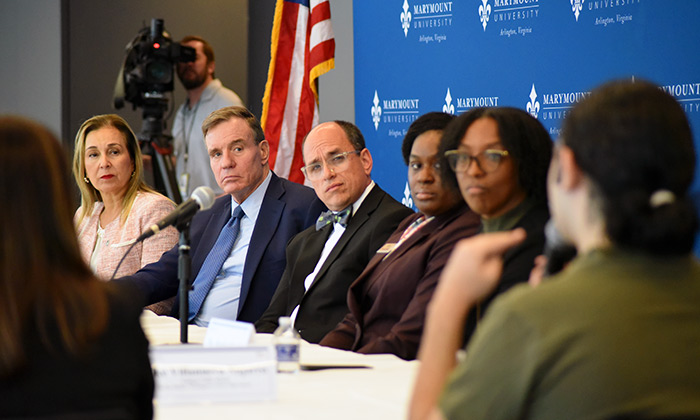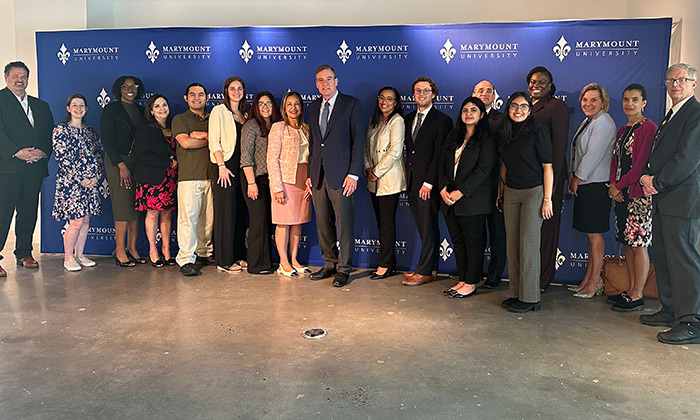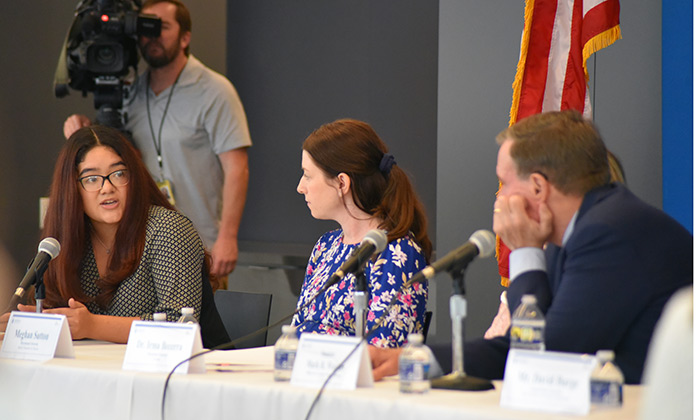This week, Marymount University hosted a roundtable discussion led by Sen. Mark Warner (D-VA) to learn more about the recent problems surrounding this year’s rollout of the Free Application for Federal Student Aid (FAFSA) and its impact on students and families. Representatives included students, counselors and administrators from Marymount, George Mason University and Northern Virginia Community College as well as Arlington Public Schools, Fairfax County Public Schools, Alexandria City Public Schools, Loudoun County Public Schools and Prince William County Public Schools.
The discussion addressed the rollout head-on, providing a deeper understanding of how FAFSA delays have affected schools, educators, counselors and students. Each participant had the opportunity to voice their concerns and offer suggestions directly to Sen. Warner.
Some students described their experience filling out the FASFA as ‘a waiting game,’ leaving them anxiety-ridden through the entire process. Counselors also shared their frustrations with trying to navigate students and parents through the FAFSA process as best as they could without having access to the form.
“I believe that the testimonials from the high school students and staff were consistent with what we’ve been fearful of since the delays began,” said Meghan Sutton, interim director for financial aid at Marymount University. “It is hard to hear how much this has impacted students this late in the year when it really should be a joyous time, celebrating new beginnings, as they would have most likely made their decisions by now in a traditional financial aid year.”
Another issue addressed during the discussion was the inconsistent reaction by colleges and universities to the FAFSA problems. Some universities moved their deadlines to accommodate students and parents — for instance, Marymount pushed its deadline back to June 1 to allow more time for prospective Saints to apply and make corrections on their forms. However, other institutions held firm to their original deadlines and deposit requests from potential students.
Sen. Warner, the first in his family to attend college, has made education advocacy one of his top issues. He was also familiar with the process of applying for student aid, and said it helped him attend George Washington University in the 1970s.
“If there is one appeal I would make for students and their families, particularly families who are first generation — don’t give up,” Sen. Warner encouraged. “Don’t give up on filling out that form. It really can make all of the difference.”
With the implementation of the 2020 FAFSA Simplification Act, one benefit was that the previous form of roughly 108 questions was trimmed to 18 questions to streamline the process. Marymount senior Natali Artiga Mora commented that the change should make things easier compared to when she applied as a first-generation student during the COVID-19 pandemic.
The roundtable concluded with agreement that trust would need to be rebuilt and transparency on all sides would be required in moving forward from the FAFSA fallout.
“As we work towards resolving these current challenges, we must remain vigilant in preventing similar disruptions in the future,” said Dr. Irma Becerra, President of Marymount University. “There must be investments in infrastructure, technology and personnel to build a more resilient financial aid system that meets the needs of all students, regardless of their socioeconomic background.”







